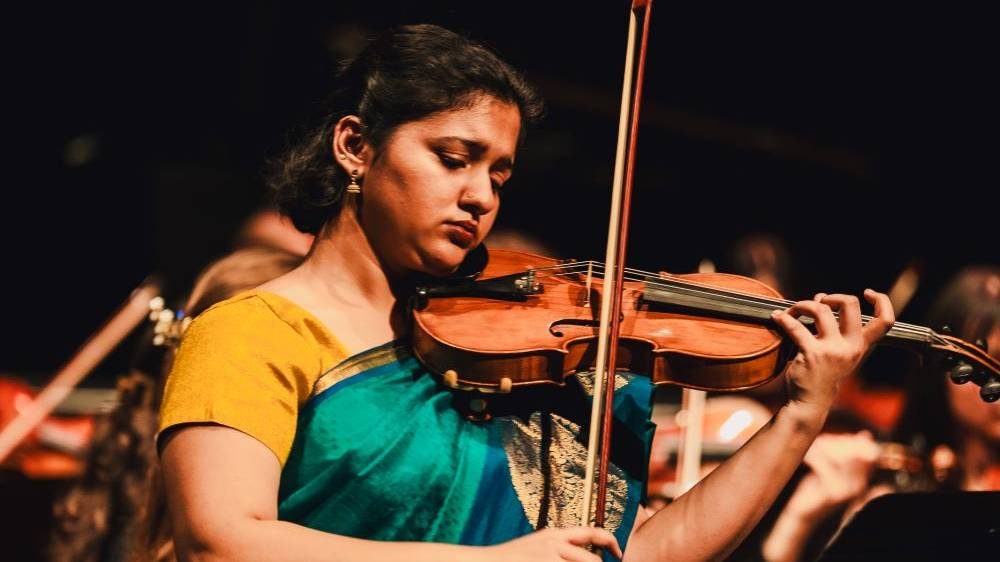
International concerts and performing with the Meissa Trio: meet our Bagri Foundation scholar Samyuktha Rajagopal
From the age of 12, Samyuktha Rajagopal has loved performing Western classical and South Indian classical music on the violin. Having finished her three-year diploma at the International Menuhin Music Academy in Switzerland, she now pursues her master’s degree at Trinity Laban, studying with Lana Trotsvek. Samyuktha has attended masterclasses with world-class musicians such as Gábor Takács-Nagy, Liviu Prunaru, Jean-Jacques Kantorow, among others, and has performed at several prestigious festivals. She is also part of the award-winning Meissa Trio. This year, she will continue to cultivate her artistic voice through performance opportunities, mentoring, and collaboration, supported by the Bagri Foundation. The Bagri Foundation works collaboratively across artistic disciplines to engage and inspire, raising the visibility of artists and experts from across Asia and the Diaspora. The Scholarship is part of the Foundation’s mission to encourage emerging artists from Asia to develop their work. We caught up with Samyuktha to find out more about her upcoming plans for the year and the highlights of her musical experiences thus far.
What is your earliest memory of the violin?
When I was four years old, I happened to walk into an instrument store in Singapore and that’s when I saw my first violin. That was the day I decided to pick up the instrument. I dreamt of playing in prestigious venues like the Royal Albert Hall and Carnegie Hall.
Last year, you performed in the morning music matinee show ‘RASA in an encounter with Western & Indian Classical Music’ at the Goethe-Institut, Chennai. Tell us more about this experience.
Rasa (Sanskrit: रस) literally means “juice, essence or taste”. It is a concept in Indian arts denoting the aesthetic flavour of any visual, literary or musical work that evokes an emotion or feeling in the reader / audience, but cannot be described. In this context, it refers to the emotional core of the music we perform and enjoy. This concert included both western and South Indian classical music, allowing the audience to compare and contrast how Rasa has been explored in both styles of music, as well as the ways in which a piece’s scale – irrespective of style – may occasionally conflict or assist with the feelings it aims to evoke. The idea was intriguing and highly informative for the musicians and the audience. With Rasa serving as the unifying theme, this unique concert was a terrific way to experience a variety of musical styles.
You’re part of the award-winning Meissa Trio, alongside fellow Trinity Laban students Sophie Ehling and Yuri Inoshita. How did you first come together and what has performing as an ensemble been like?
In October 2023, the Meissa Trio was established. Matthew Denton and David Cohen are our frequent coaches alongside Martino Tirimo. We have participated in masterclasses with Raphael Wallfisch, the Carducci Quartet, and the Linos Trio, among others. We’ve had the opportunity to perform at a number of prestigious locations in London, including the Old Royal Naval College Chapel, the University Women’s Club, the Polish Hearth Club, and St James’s Piccadilly. Our concert at St James’s Piccadilly in November 2023 was my favourite. Although this was our first concert and we were very anxious, I felt at ease as soon as we began to perform and I was ecstatic to be playing with these two incredible musicians. Thanks to this concert, we have the self-assurance to play as a trio, pursue our goals, and make a name for ourselves on an international level. Winning Second Prize in the MIMA Young Artist Competition and First Prize, Outstanding Laureate, in the World’s Best Musicians Competition, were particular highlights. The latter, based in Warsaw, was our very first competition and a much-needed confidence boost for our trio – we are extremely grateful for this. We’ve recently also had the privilege of being one of the ensembles to be enrolled in the Lavethan Easter Course in Chamber Music in April 2024.
You’ve performed in several prestigious festivals, including the Pablo Casals Festival and Pietrasanta in Concerto Festival. Is there one performance that particularly stands out to you?
On 12 July 2023, I performed at the Festival de Bellerive in Geneva, Switzerland. This was an extremely special performance where I had the honour of playing a South Indian Classical piece along with a western classical accompaniment played by my colleagues and friends at the International Menuhin Music Academy. The composition is titled “Raasa Leela” and was written by the father of Mr. V S Narasimhan, my teacher. The western accompaniment was initially composed by my teacher for a quartet, which I subsequently arranged for a string ensemble. Being able to represent my culture in such a prominent venue was an amazing experience. This will forever be ingrained in my memory.
What are you most looking forward to in the next year of your master’s?
I am most excited about performing at prestigious venues with the knowledge I have gained from my first year, working on new repertoire with my teacher Lana Trotovšek, and collaborating with many other artists who can share their knowledge of several other musical genres.
